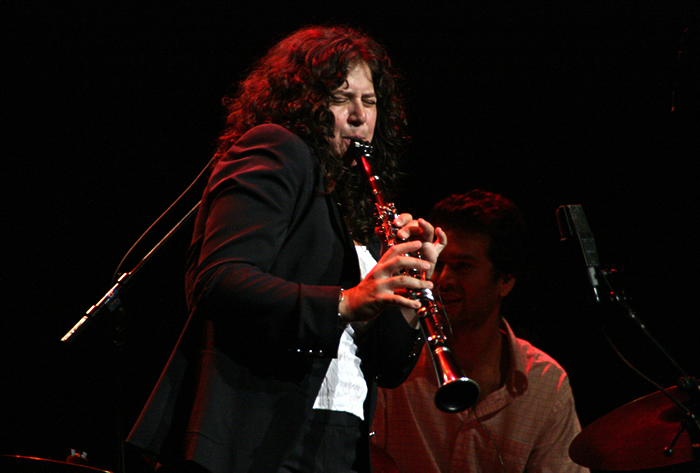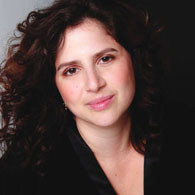Because it’s not about anything but individual choices and individual feelings of being together and experiencing something together and sharing love, which is incredible. – Anat Cohen
[The following is an edited version of a longer conversation]
With a refreshing effervescence, Anat Cohen continues to explore the boundaries of her limitless musical talents. Originally, from Tel-Aviv Israel, Anat surfaced in New York City, searching relentlessly for opportunities to hone and develop her craft. Her travels and experiences continue to shape her musical identity, propelling her into “conversations”. In this interview, we discuss topics ranging from her musical growth, to her willingness to adapt to different styles of music. Anat Cohen has a new album called Claro Scuro (Clear and Dark) set to be released in September 2012 via her record label Anzic Records. She also has a four-night residency at the Jazz Standard in New York City commencing on July 26th – 29th 2012. Please check out her website www.anatcohen.com for more details on her career and music.
iRJ: How has your music changed since your first album?
AC: It’s a good question. It’s a very good question. I think more than the fact that my music has changed is that the way I play and the way I feel; music has shifted some. So in other words, even if I take the same songs that I play on my first album, which I never play actually anymore, but even if I take those songs, I think my search in feeling, making myself…the direction is to make myself free while playing—free music. So, it’s more about the way I approach as a soloist, as a player, as being part of a band. The comfort zone that I look for, pushing the envelope. I think that feeling for me has changed. Now, I don’t know how it feels to someone else. I know that for me it’s a constant development.
iRJ: It’s a constant development. That’s interesting. Yeah, I mean it must be one of the greatest challenges as an artist, so I think that’s fair to say that it begins with you. You arrived in New York City in 1999. In your opinion what was the jazz scene then, compared to now?
AC: Hmmm…. You’ve asked me really hard questions! I have to think about it for a second! You know I think the spirit hasn’t changed since I got to New York. I think the search for musicians to get together and to look for the next thing, to look for the next sound here in New York hasn’t changed. There’s always the new kid on the block; there’s always new sounds. You know, living in New York is a constant discovery. Because you think you know some cats, and someone introduces you to someone that you never heard of, and that person is playing with a whole circle of musicians you’ve never heard of and they’re all fantastic musicians and they’ve been doing their thing somewhere around the city! The fact that there are different scenes hasn’t changed. I’m not sure how New York has changed. I’ve been on the road much more.
iRJ: You travel more?
AC: Yeah. The last year, I’ve been on the road a lot. So, I don’t get to hang out as much in the city. When I got to New York, and I wasn’t working as much, I was travelling some, but basically, I put the soprano sax on my back. And, I was living in Queens or Brooklyn and just went into the city and I would hang out from a bar, to jazz club to a coffee shop to anywhere and just go from one gig to another. I was always shifting between different scenes—Brazilian scene to Trad-jazz to more exploring jazz. That hasn’t changed. Some people still have the same gigs, but not many. I don’t get to hang out as much as I used to. This is a very good question. I would be curious to ask around, to see what other people come up with.
iRJ: In your music, you said you have a willingness to adapt to various styles of music: Brazilian, Argentine. Where does that willingness come from to do that?
AC: I got to meet people from all around the world, when I went to Berklee. I met musicians who were like me. I came from Israel, and they came from other countries. Our common ground was that we loved jazz. We loved music that was created years before we were born. We were all using jazz as a common ground but with different rhythms and I felt like in order to understand those rhythms since I didn’t grow up in those countries, hanging out with these people, really getting the feel; it was very important for me to feel the music, not just to understand it with my mind. So, if I had to dance in order to learn the music, then I would learn to dance it. But, I wanted to feel it so I can own it, so I could be comfortable and then be who I am. So, I think the willingness is coming from the search to be comfortable. It comes from the search to imitate, to sound local and not to stick out. Once I can do that, I can look to bring other elements from everything I have experienced so far.
Anat Cohen: Claroscuro – Long EPK from Anat Cohen on Vimeo.
iRJ: Leading on that, you’ve said many times that music is a “conversation” in many interviews. In your opinion, does it mean it is spiritual? It is a term you’ve used before.AC: It is definitely spiritual. But not every conversation is spiritual. Not every experience, though. “Spiritual” means different things to people. The spiritual part comes when you have a moment when everyone on stage can feel that moment…the stage and in the room is breathing together. There is tension, an excitement; there is some kind of process that an audience and band go together into a solo…some kind of spiral…that’s the spiritual part I am talking about. You know that everyone is in some sort of trance. They are inside music. But they surrender to it. I think for me that’s the spiritual part of what we’re doing. I don’t want to confuse it with the religious side; I don’t want to offend anybody. But, it’s pure. It’s so pure. Because it’s not about anything but individual choices and individual feelings of being together and experiencing something together and sharing love, which is incredible. And, when those moments happen, and I have to say they don’t always happen on every gig, but they happen here and there. They are so special. And, you know when you get off stage and look into people’s eyes you know that those people were willing to be a part of that experience. They went somewhere; they let themselves feel. And, in this day and age when everything is so quick, and everybody is trying to have the minimum amount of time for every experience to save time, I mean we’re saving so much time, but I’m not sure what we’re saving really!
You know that people are grateful and I’m grateful. That’s what I live for…those very specific moments. There are a lot of things happening when you go on the road. There are a lot of things going on in our lives and journeys as musicians and not everything is shiny and gold! There’s a lot of BS around. It’s amazing how rewarding those moments are. And, it makes it all worthwhile. These are the spiritual moments. Now, going back to what we are talking about…How to feel free—the goal is to get there. It is to find musicians who are there with you, who are beyond technicality; they’re beyond notes. They are ready to make music to have a conversation, to create something—an emotional experience. Not every musician is into the same emotional experience. Each person has a different approach. It’s like you walk into a museum and some painting or artwork is shocking and you have to walk away. Sometimes you look at it and say “this looks interesting” and you’re not sure how you feel about it and sometimes you get sucked in. Every artist has their own way of approaching their art, and I don’t know what’s the right way or the wrong way. But really, I’m after the emotional experience.
iRJ: I only have a couple more questions! Is there a style of jazz you’d like to explore that you haven’t yet?
AC: I don’t know if it’s a style of jazz. There are fields I haven’t tried. Sometimes I’m thinking I want to do things that are more electronic or using effects. But, it takes time to explore sound. I am open to suggestions too. I like to collaborate with people. I like when people show me new stuff and we dive in.
iRJ: Last but not least, In your opinion is jazz a lifestyle?
AC: Yeah.
iRJ: Yes?
AC: Yes! Again, define the word jazz…. For me, it’s hard. Today, there is a lot of discussion about the term “jazz”. For me, when I think of the word “jazz”, I think of a way of communication; a way of interaction with other people. I think of respect for other people, I think of accepting other people’s ideas. When you’re in a jazz band, it’s just like a society. If there is someone new, you have to let them in, if they have an idea. You have to have respect for the people that know what they are talking about—for the elder generation or for just people who have been out there longer. You have to figure out how to communicate, how to find a common language. Really, how to interact takes a lot of respect and patience from each other. It takes a lot of attitude; and you have to be strong and you have to be gentle. It’s really the way you are when you walk into the room and the way you are when you play on the bandstand. And, it’s a constant exploration; it’s a never-ending curiosity and being with open mind and accepts all people. And, I think that’s definitely a way of living, if you think of the larger scale of things—not just a style of music.
by Mark A. Moore



